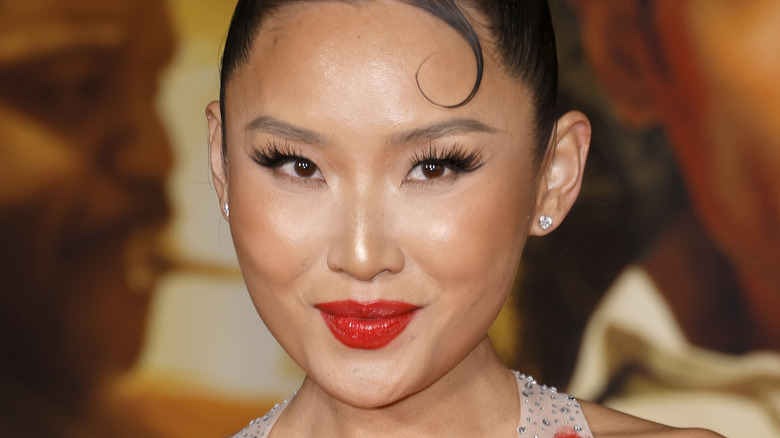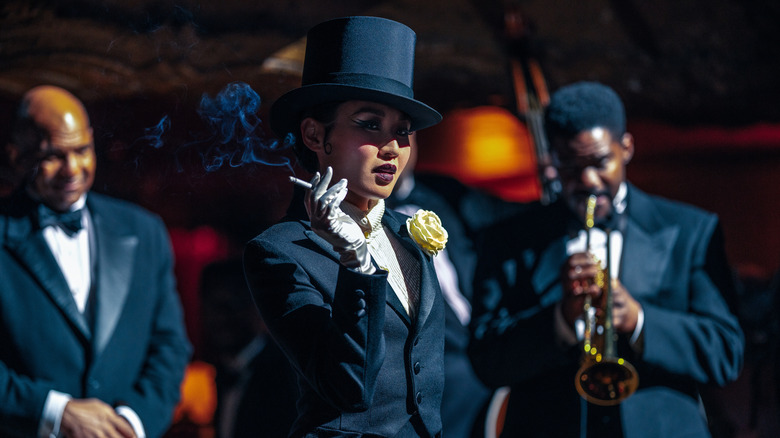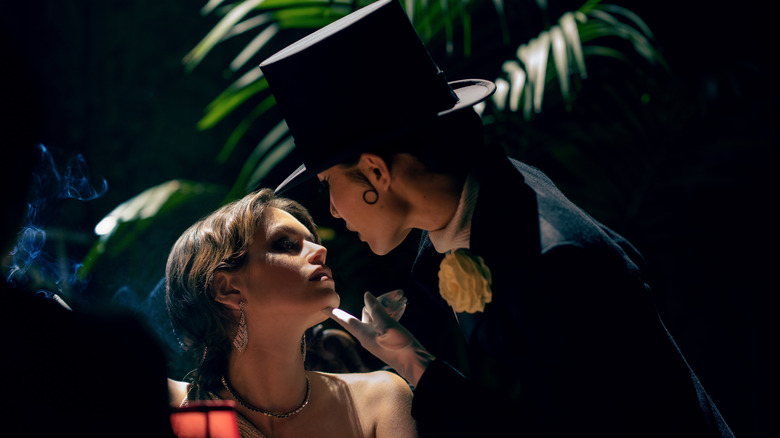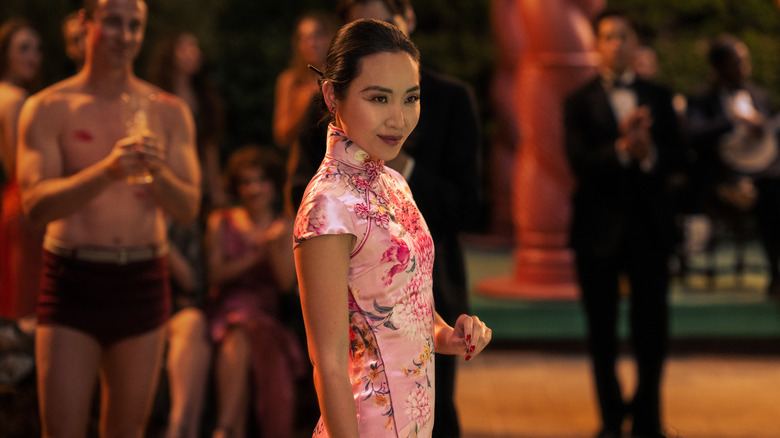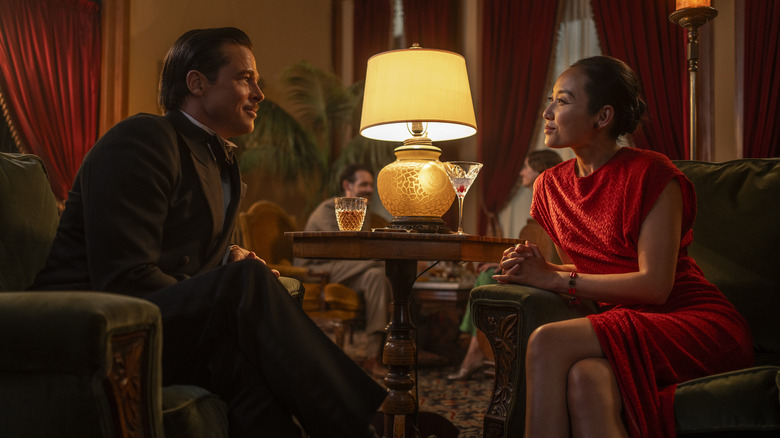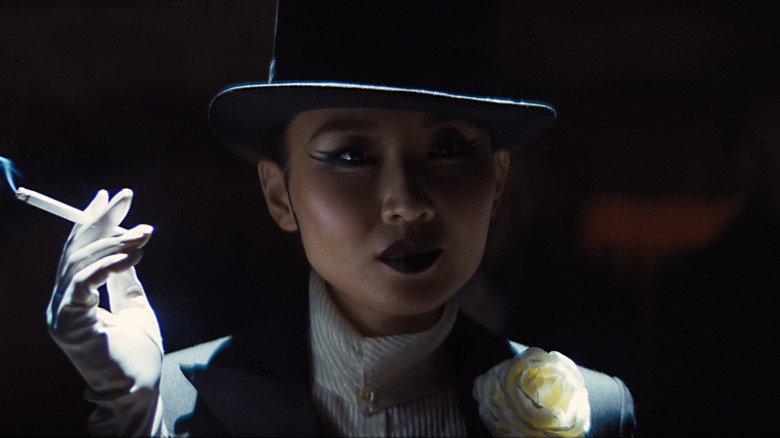Babylon Star Li Jun Li On The Hollywood History Behind The Movie And More - Exclusive Interview
"Babylon" is writer-director Damien Chazelle's epic, three-hour tale of a transitional era in Hollywood — when the fledgling movie business was not just adapting to the introduction of sound into motion pictures, but also facing the end of an era when debauchery, hedonism, and naked ambition fueled the lives of everyone who came to the desert town of Los Angeles looking to find their way in front of a camera.
It was also an era where racism and bigotry bubbled under the surface of the town's seemingly liberal veneer, where the color of people's skin or the nature of their sexuality was often used for both private and public entertainment, then frowned upon in everyday life. Perhaps no character embodies that more than the enigmatic Lady Fay Zhu, a chanteuse who emerges at the film's opening Hollywood bacchanal in top hat and tux to sing the shocking (and real) "My Girl's P***y" to the eager crowd.
As played by Li Jun Li, Lady Fay leads multiple lives: She's not just a singer, but she also writes title cards for silent films and helps out in her father's laundromat. To the Hollywood crowd, she's seen as something exotic, the "Ornament of the Orient," and while her queerness is lapped up by the party crowd, it's actively discouraged in her "real" life. Yet somehow, Lady Fay rises above it all, holding onto her dignity and self-worth as others around her can't.
Lady Fay — like other characters in the film played by Brad Pitt, Margot Robbie, and others — is inspired by a real person: Anna May Wong, considered the first Chinese-American actress to become a movie star. "What really stuck out for me was her resilience," Li told Looper in our exclusive interview, "and how little she cared about what other people thought."
How Li Jun Li saw Lady Fay and the real-life actress who inspired her
Your character and maybe Jovan Adepo's character are probably the ones whose souls are relatively intact by the end of the film. Would you agree with that? What defines Lady Fay's character for you?
Well, Jovan and I were talking about this. The theme here for him and me mostly was how far you would go to pursue your dream and success without sacrifice. How far would you sacrifice? At what point do you draw that line? It's funny that you started off with Jovan's and my characters leaving with our souls intact, because they were the only ones who stood their ground and put boundaries up before moving further, if that makes sense.
As you probably know, [Lady Fay] is based on Anna May Wong with some inspiration from Marlene Dietrich in "Morocco" for that opening scene. What really stuck out for me was her resilience through all of the struggles and hardship she had to endure in that world, being one of the only POCs in the industry, and how little she cared about what other people thought. She has developed quite a thick skin, being in this industry for that long and seeing everything over the years.
Leading the double or even triple life that she has, was that part of Anna May Wong's back history, or did you get that from other figures of the era?
Anna May Wong was very much just an actress. She did dance in her films, famously in "Piccadilly," amongst others. But [director] Damien [Chazelle] has mentioned that back in the day, actors weren't considered the same way as they are today — hence the line in the film, "No actors or dogs allowed," because actors those days were always juggling multiple jobs at once. It was very typical of people back then to be like Lady Fay was — a title card writer, a performer at the jazz club, and sometimes acting — but it isn't true of Anna May Wong.
Lady Fay's public and private sexuality
What was it like to find out that you were going to sing that song, which was a real song from the era?
When I first read the script, only the lyrics of the original songs were in the script. Of course, my jaw dropped, and then when I looked it up, I started laughing ... The original song is very upbeat and very happy, so that's how I envisioned Lady Fay and how we would have to sing it. But later on, Damien actually said that it would be a completely different song. Then we got the music, and we adapted the lyrics from that song into this music.
Her sexuality is seen as something that is provocative and titillating — but only at these Hollywood parties. When she actually has a relationship with another woman in real life, that part of her has to be buried. Did you get the sense that's how these things were handled at the time in real life?
Yes. Anna May Wong never married, and there was a lot of speculation about her and Marlene Dietrich. Nothing was ever confirmed, nor was her sexual preference or sexual identity ever confirmed. Back in the day, not too dissimilar to today, a lot of people had to hide who they were to sustain their careers or keep their success. It's a double standard. They want to see it as a performance, and it can be used for entertainment, yet it cannot be real. It is not accepted at all. It's exactly the same with the scene with Marlene Dietrich in "Morocco." People loved it, but nobody would accept her if she was [like that] in real life.
The racism in Babylon took decades to finally start changing
The other thing is the racism at the time. Lady Fay leans into the "Orientalism" that people in the film find so fascinating and weird and exotic. What, if anything, surprised you or shocked you the most about that? How is it relevant to experiences that have gone on right to the present day?
She sings the song in the movie with an accent, but when you hear her speak, she's completely American without any accent. That is true to Anna May Wong's character — she was famously known for saying she had died a thousand deaths because she was in so many films, in all of which she played the villain and was killed in a crude manner of some sort. She was always pigeonholed to play either the dragon lady or some fetishized version of "Oriental" something.
That, unfortunately, has been happening up until probably just a few years ago, because I know when I first started acting over 10 years ago, I didn't have any opportunities, and most of the roles that I was even considered for were specifically Asian or minimal or a side note. Oftentimes, I was asked to use an accent. Because there's been so much movement and so much progression in diversity and inclusivity, we're finally being considered for roles that aren't stereotypical to what had been. Whether it's as outward as it was 100 years ago, it was still very much on people's minds.
These days, people are trying to make the change, which I so appreciate, and I'm grateful for being in the middle of this movement. But it's hard to break these habits. People subconsciously think about it whether or not they notice.
How did sound affect the movie industry?
The movie hints that the introduction of sound was both a boon and also, in some ways, not a great thing for the film business. Do you think that this was a change that was ultimately for the better, or did it put too much reliance on the idea of sound and words and exposition as opposed to images?
I think it changed things for the better, although perhaps not for the actors who struggled to make the same transition. The revolution or evolution of film ... Jovan [Adepo] and I kept saying it will always continue to change, just like how, in the last few years, the streaming options have blown up, obviously due to the pandemic. At the same time, we hope that a film like "Babylon" will inspire people to go back to the cinemas and appreciate movie making [and] enjoy the special event in which we go to the movie in a massive theater with audience members next to us.
It's definitely a movie made for the big screen. Did you get to keep anything that you wore in the movie? Did they mysteriously disappear from the set during your last day of shooting or anything like that?
[Laughs] I did keep one of the doubles for the green silk pajamas that you briefly see in the scene between Margot [Robbie] and me when she's rehearsing her lines. It was originally meant to be used for a stunt double. I was originally supposed to carry Margot over my shoulder after the snake fight, but that didn't make it into the film. I got to keep the pajamas, and I didn't have to steal it because they handed it right to me.
Li Jun Li on her favorite movies and upcoming projects
We talked about seeing movies on the big screen. Do you have a favorite movie that you would love to watch on the big screen again instead of watching on a Blu-ray or something like that?
I definitely most recently appreciated watching "Top Gun: Maverick" on the big screen. I felt like there was no way [to not see it that way]. I know that they got postponed by years for its premiere, but it was well worth it. It's movies like that that you cannot do justice anywhere else.
Do you have a favorite movie of all time?
Many, but I will say this — I absolutely love "In the Mood for Love" by Wong Kar-Wai. What made it extremely special was when I first started working with Damien [Chazelle] and he was sending me his mood boards and visuals and inspirations for "Babylon," that was one of the first films that he had sent me. I nearly fell off my chair when I saw it. I was so excited.
I know you've done some recurring work on the show "Evil," and they're coming back again for another season. Have they called you to come back?
They have rung me, but I'm currently not planning on doing that because of schedule issues. But I loved working with them. I love the actors [and] the producers, and I hope that there is a world where we can resume that role. It's a really good show. I really enjoyed it.
What are you working on now?
I'm working on Peacock's "Based on a True Story" with Kaley Cuoco, and it's a dark comedy. It's by the same producer as "The Boys" on Amazon, and it's something I'm looking forward to because I don't get to do comedy often.
"Babylon" opens in theaters on Friday, December 23.
This interview has been edited for clarity.
